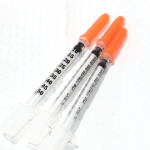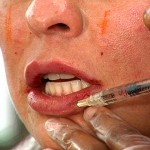Cosmetic Injectables: Are they Safe?
0New data compiled for the years 2003 through present, demonstrates the risk of adverse events such as swelling or allergy from cosmetic injection with U.S. FDA-approved dermal fillers number .010% or 1 in 10,000; the risk of injury is .009% or 1 in 11,000.1 Notably, the data is derived from the November 18, 2008 U.S. FDA Executive Summary reviewing reported dermal filler complications from 2003 to through September 20, 2008, and is relative to audited annual procedural statistics by the American Society for Aesthetic Plastic Surgery, a compilation of procedural numbers performed by board-certified plastic surgeons, facial plastic surgeons, oculoplastic surgeons and dermatologists.
“This review of U.S. FDA approved dermal fillers and reported complications dating back to 2003  demonstrates that complications experienced from dermal filler injections are congruent to those potential adverse outcomes reported on FDA-required product labeling and conveyed by qualified physicians during the informed consent process,” said coalition spokesperson, plastic surgeon Jeffrey Kenkel, MD of Dallas, Texas. “In addition, the data, in perspective, is assurance to consumers that the incidence of complications is relatively low, and in fact complications are further reduced when injections are performed by properly board-certified and trained physicians.”
demonstrates that complications experienced from dermal filler injections are congruent to those potential adverse outcomes reported on FDA-required product labeling and conveyed by qualified physicians during the informed consent process,” said coalition spokesperson, plastic surgeon Jeffrey Kenkel, MD of Dallas, Texas. “In addition, the data, in perspective, is assurance to consumers that the incidence of complications is relatively low, and in fact complications are further reduced when injections are performed by properly board-certified and trained physicians.”
• The Executive Summary of the U.S. FDA lists 930 unique, adverse events reports filed between January 1, 2003 and September 20, 2008.
• The most common adverse events involved swelling (cited in 40.6% of reports), inflammation (cited in 35.5% of reports), and erythema (cited in 33.4% of reports).
• 94 adverse events of the estimated 9 million procedures performed required surgical intervention, 638 adverse events were treated with medication, the remaining of the 930 reported adverse events did not specify how the event was treated.
• The country of origin for 135 of the adverse events reported was outside the U.S.
Additionally, within the report of the U.S. FDA, is specifically stated that in some cases of reported complications, “the injections of dermal implants are performed by untrained personnel or in settings other than health clinics or doctors offices.”
“The data is evidence of what this Coalition and properly trained physicians believe– U.S. FDA approved  cosmetic injectables to enhance appearance are predictable, safe and satisfying procedures when properly administered by appropriately qualified physicians,” stated Coalition leader, facial plastic surgeon Ira D. Papel, MD, of Baltimore, Maryland. “Serious complications and adverse outcomes occur with unregulated, unreported, unbranded and unapproved injectables, as well as when injectables are administered by untrained individuals who lack complete training in facial aesthetics.”
cosmetic injectables to enhance appearance are predictable, safe and satisfying procedures when properly administered by appropriately qualified physicians,” stated Coalition leader, facial plastic surgeon Ira D. Papel, MD, of Baltimore, Maryland. “Serious complications and adverse outcomes occur with unregulated, unreported, unbranded and unapproved injectables, as well as when injectables are administered by untrained individuals who lack complete training in facial aesthetics.”
“Plastic surgeons, facial and oculoplastic surgeons and dermatologists define those medical specialists under which dermal injections are appropriately within the scope of practice,” said Dr. Kenkel. “These board-certified specialty trained physicians possess more than experience with dermal fillers. They legitimately and skillfully can educate patients not only on the benefits of cosmetic injections, but also on the alternatives, risks and have the ability to demonstrate outcomes achieved through photographs, consistent results, and happy patients who return to repeat treatment. Additionally, it is these physicians who take the responsibility to report complications whether those complications occur in the physician’s own hands, or at the hand of another.”
An October 2008 survey of Coalition member physicians reported a 75% increase in the number of complications seen by plastic surgeons, facial plastic surgeons and oculoplastic surgeons resulting from injections administered in a non-medical setting or by an unqualified, untrained injector or non-specialist. Consumers are cautioned that no reported outcomes or safety data exists for cosmetic injections marketed and administered by many non-specialist physicians and even non-physicians. “These providers are unorganized, unrecognized and informal in the training and practice of cosmetic medicine, which should raise consumer’s awareness and caution,” added Dr. Papel. The Coalition, charged with educating consumers on safe choices in cosmetic injections and eradicating the use of counterfeit and illegally imported cosmetic injectables, suggests all consumers follow very cautious steps for both safe, and positive outcomes when considering a cosmetic injection of any kind, be it a dermal filler, or botulinum (Botox) injection:
• Doctor: Ask specifically about your doctor or injectors qualifications. Choose a doctor who specializes in treating all cosmetic concerns of the face, such as a board certified plastic surgeon, facial plastic surgeon, oculoplastic surgeon or dermatologist and who examines you, prescribes and performs cosmetic injections in a licensed and properly equipped medical facility. Establish a positive and on-going relationship with your doctor and follow-up as directed. A nurse or physician’s assistant may perform your injection if you elect, but a licensed physician must prescribe the treatment.
• Brand: Ask specifically the brand name of the injectable recommended for you, the approval status of regulatory agencies in the country where you will be treated (the FDA in the United States) and about any potential outcomes and the likelihood of adverse events. If your doctor does not offer, ask specifically to see the packaging and identifying marks that can verify authenticity, including the serial and lot number (which as a matter of proper procedure must be recorded in your medical chart).
• Safety: If you suspect your injector is not properly trained, is not following proper procedure or is injecting you with a non-branded, non-approved or unsafe substance, do not accept treatment.
To learn more about the benefits of cosmetic injections, the uses for approved cosmetic injectables, to plan for your treatment, see video of live, appropriately administered injectables and more, visit http://www.injectablesafety.org and http://www.realself.com/injectable-safety-campaign
Information Provided by the American Society for Aesthetic Plastic Surgery.



